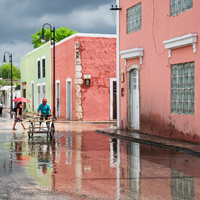Moving to Tulum, Mexico
Last updated on May 03, 2025
Summary: Moving to Tulum, Mexico: Expats, retirees and digital nomads talk about everything you need to know before moving to Tulum.
What do I need to know before moving to Tulum?
When we asked people what advice they would give someone preparing to move to Tulum, they said:
"Before moving to Tulum, expats should know that the cost of living is relatively high compared to other parts of Mexico due to its popularity as a tourist destination. It's important to understand that while Spanish is the official language, English is widely spoken in tourist areas. Expats should be aware that Tulum is located in a tropical climate, which means it can be hot and humid, with a rainy season from May to October. Healthcare in Tulum is adequate for minor health issues, but for serious conditions, you may need to travel to Playa del Carmen or Cancun. Expats should also know that while Tulum is generally safe, like any tourist destination, it can have issues with petty crime, so it's important to take standard precautions to protect your belongings. It's also important to note that Tulum is a small town with limited resources, so it may not have all the amenities and services that you're used to. Expats should be prepared for a slower pace of life, which is part of Tulum's charm for many people. Understanding the visa requirements is crucial before moving to Mexico. For stays longer than 180 days, you will need to apply for a temporary resident visa. Expats should also be aware of the local customs and traditions to respect the local culture. It's also recommended to learn about the local cuisine, as Tulum is known for its food scene, with a mix of traditional Mexican, Mayan, and international cuisine. Lastly, expats should know that Tulum is known for its eco-friendly lifestyle. Many homes and businesses use solar power, composting, and other sustainable practices. Therefore, being environmentally conscious is a part of living in Tulum," replied a member in Tulum.
How do I find a place to live in Tulum?
We asked expats how they chose their neighborhood and found a place to live. They answered:
"Finding a place to live in Tulum, involves several steps. First, you need to determine your budget and the type of accommodation you're looking for. This could range from a small apartment to a large villa, depending on your needs and financial capabilities. Next, you should research the different neighborhoods in Tulum to find one that suits your lifestyle. Some areas might be closer to the beach, while others are closer to the town center. You should also consider factors like safety, proximity to amenities, and the general vibe of the neighborhood. Once you have a clear idea of what you're looking for, you can start your search. There are several online platforms where you can find listings for rentals in Tulum, such as Airbnb, Booking.com, and local real estate websites. These platforms allow you to filter results based on your preferences, and you can often read reviews from previous tenants. In addition to online searches, you might also want to consider hiring a local real estate agent. They can provide valuable insights into the local market, help you negotiate prices, and guide you through the process of signing a lease. Visiting Tulum before you move is also a good idea. This allows you to view potential homes in person and get a feel for the different neighborhoods. If this isn't possible, try to arrange a virtual tour of the property. Finally, once you've found a place you like, make sure to read the lease agreement carefully before signing. It's important to understand the terms and conditions, including the rent, deposit, length of the lease, and what's included in the rent. If you're unsure about anything, don't hesitate to ask for clarification," said one expat in Tulum.
What is a typical expat home or apartment like in Tulum?
"A typical expat home or apartment in Tulum, often reflects a blend of modern and traditional Mexican architecture. The homes are usually spacious, with open floor plans that allow for plenty of natural light and air circulation. They often feature a large living area, a fully equipped kitchen, and multiple bedrooms and bathrooms. Many homes also have private outdoor spaces, such as a patio, balcony, or even a small garden. The interior design often incorporates local materials and artisanal touches, such as handmade tiles, hardwood furniture, and woven textiles. Many homes also have modern amenities like air conditioning, high-speed internet, and state-of-the-art appliances. In terms of location, many expat homes are situated in safe, well-maintained neighborhoods that are close to the beach, restaurants, and shopping areas. Some are part of gated communities or condominium complexes, which often come with additional amenities like a shared pool, gym, or security services. Despite the modern comforts, many expat homes in Tulum also strive to be eco-friendly, with features like solar panels, rainwater collection systems, and energy-efficient appliances. This is in line with Tulum's reputation as a sustainable and environmentally conscious destination. Overall, a typical expat home in Tulum offers a comfortable and stylish living environment that combines the best of modern convenience and local charm," said one expat who made the move to Tulum.
What is the average cost of housing in Tulum?
If you are thinking about moving to Tulum, cost of living in probably a key consideration. Expats commented about the cost of housing:
"The average cost of housing in Tulum can vary greatly depending on the location and type of property. For instance, a one-bedroom apartment in the city center may cost around $500 to $800 per month, while the same type of apartment outside the city center may cost around $300 to $500 per month. If you're looking to buy property, a one-bedroom apartment in the city center can cost around $100,000 to $150,000, while a similar property outside the city center may cost between $50,000 and $100,000. Luxury villas and beachfront properties can cost significantly more, often exceeding $1 million. Please note that these are estimated prices and actual costs may vary," replied a member in Tulum.
Should I buy or rent a home in Tulum?
If you have not spent a lot of time in Tulum, you should rent before even thinking about buying. We asked expats there about the buy vs. rent decision:
"The decision to buy or rent a home in Tulum, largely depends on your personal circumstances, financial situation, and long-term plans. If you plan to stay in Tulum for a long period or frequently visit, buying a home could be a good investment. Owning a property in Tulum can also provide a potential source of income if you decide to rent it out when you're not using it. On the other hand, renting a home in Tulum offers more flexibility. It's a good option if you're not sure how long you'll be staying or if you prefer not to have the responsibilities and costs associated with homeownership. Renting can also be a good way to get to know the area before committing to a purchase. It's also important to consider the real estate market in Tulum. The town has seen significant growth in recent years, which has driven up property prices. However, this also means that there could be potential for property value appreciation in the future. Lastly, you should consider the legal aspects of buying property in Mexico as a foreigner. Mexico has specific laws regarding foreign property ownership, especially in coastal areas like Tulum. It's recommended to consult with a local real estate attorney to understand the process and ensure that all legal requirements are met. In conclusion, both buying and renting a home in Tulum have their advantages and disadvantages. It's essential to carefully consider your personal situation and do thorough research before making a decision," said one expat in Tulum.
What should I pack when moving to Tulum?
We asked people living in Tulum to list three things they wish they had brought and three they wish they had left behind. They responded:
"When moving to Tulum, it's important to pack lightweight and breathable clothing due to the tropical climate. This includes items like shorts, t-shirts, tank tops, and sundresses. You should also pack a few swimsuits for the beach and water activities. Don't forget to pack a good pair of walking shoes or sandals, as well as a pair of water shoes if you plan on visiting the cenotes. A hat, sunglasses, and plenty of sunscreen are also essential to protect yourself from the sun. You should also pack a rain jacket or umbrella, as Tulum can experience sudden rain showers. If you plan on dining at upscale restaurants or visiting more formal venues, pack a few dressier outfits. Remember to bring all necessary toiletries, including travel-sized shampoo, conditioner, body wash, and toothpaste. However, keep in mind that these items can also be purchased locally. Pack any prescription medications you need, along with a basic first aid kit. It's also a good idea to bring a reusable water bottle to stay hydrated. If you plan on using your electronics, don't forget to pack the necessary chargers and adapters. Lastly, bring important documents such as your passport, driver's license, and any necessary visas or residency paperwork. It's also a good idea to have copies of these documents in case of loss or theft," remarked one expat who made the move to Tulum.
 Dream Pro Homes Luxury
Dream Pro Homes LuxuryConnect
Dream Pro Homes Luxury owner Greg Gunter is the Broker for Berkshire Hathaway HomeServices offering luxury home options in the UNESCO city of San Miguel de Allende, Mexico, rated the No. 1 City in the World five years running from Conde Nast Traveler and Travel & Leisure magazines.
Click connect to have our partner contact you via e-mail and/or phone.
 Dream Pro Homes Luxury
Dream Pro Homes LuxuryDream Pro Homes Luxury owner Greg Gunter is the Broker for Berkshire Hathaway HomeServices offering luxury home options in the UNESCO city of San Miguel de Allende, Mexico, rated the No. 1 City in the World five years running from Conde Nast Traveler and Travel & Leisure magazines.
Connect
Click connect to have our partner contact you via e-mail and/or phone.
What cultural faux pas should I try to avoid making in Tulum?
We asked people in Tulum if they could share any humorous cultural blunders they commited. For new expats, keep in mind that these incidents are an inevitable part of expat life. Learning to laugh about them is the key!:
"When visiting Tulum, it's important to respect the local customs and traditions. Avoid making negative comments about the country, its people, or its culture, as this is considered disrespectful. Do not litter or damage the environment, especially in the protected areas and ruins. Tulum is known for its beautiful natural landscapes and historical sites, and it's important to preserve these for future generations. Avoid wearing revealing clothing, especially in religious or sacred places. While Tulum is a beach town, it's still important to dress modestly when visiting churches or other religious sites. Do not take photos of people without their permission. This is considered rude and invasive. Always ask before taking someone's picture. Avoid being loud or disruptive in public places. Mexicans value respect and politeness, so try to keep your voice down and avoid causing a scene. Do not assume everyone speaks English. While many people in Tulum do speak English, it's respectful to learn a few basic phrases in Spanish. Avoid haggling too aggressively. While bargaining is common in Mexico, it's important to do so respectfully and not push too hard for a lower price. Do not disrespect the local cuisine by asking for substitutions or changes to traditional dishes. Mexican cuisine is a source of national pride, and it's considered rude to alter traditional recipes. Avoid public displays of affection. While it's not strictly taboo, excessive public displays of affection can be seen as disrespectful in Mexico. Do not ignore local customs and traditions. For example, it's customary to greet people with a handshake or a hug, and to say "Buenos días" (Good morning), "Buenas tardes" (Good afternoon), or "Buenas noches" (Good night) depending on the time of day," remarked one expat in Tulum, Mexico.
What are medical services in Tulum like?
When we asked expats and global nomads about the quality of medical care in Tulum, they replied:
"Being a small town with a lot of clinics and one small private hospital, we have most everything we need. Being 30 minutes from Cancun and Playa del Carmen enables us to find whatever we need," stated one expat who made the move to Tulum.
About the Author
 Joshua Wood, LPC is one of the Founders of Digital Nomad Exchange and serves as Co-President of Expat Exchange. Prior to Expat Exchange and Digital Nomad Exchange, Joshua worked for NBC Cable (MSNBC and CNBC
Primetime). Joshua has a BA from Syracuse and a Master's in Clinical and Counseling Psychology from Fairleigh Dickinson University. Mr. Wood is also a licensed counselor and psychotherapist.
Joshua Wood, LPC is one of the Founders of Digital Nomad Exchange and serves as Co-President of Expat Exchange. Prior to Expat Exchange and Digital Nomad Exchange, Joshua worked for NBC Cable (MSNBC and CNBC
Primetime). Joshua has a BA from Syracuse and a Master's in Clinical and Counseling Psychology from Fairleigh Dickinson University. Mr. Wood is also a licensed counselor and psychotherapist.
Some of Joshua's articles include Pros and Cons of Living in Portugal, 10 Best Places to Live in Ireland and Pros and Cons of Living in Uruguay. Connect with Joshua on LinkedIn.
![]() Mexico Forum
Mexico Forum
Talk with other digital nomads and expats in Mexico on our Mexico forum - meet people, get advice and help others.
![]() Contribute
Contribute
Help others in Mexico by answering questions about the challenges and adventures of living in Mexico.
Digital Nomads in Mexico offer advice about healthcare, hospital visits, emergency rooms visits, finding a doctor and buying health insurance in Mexico.






